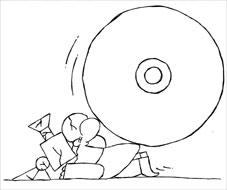|
A report on illegal copies of on-screen films
Catch Me if You Can!
|
 A major crisis with which the Iranian cinema has been facing during past few years has been illegal copy and distribution of feature films on CDs and DVDs. Of course, this problem is worldwide and many prominent American or European films can be downloaded from the Internet or be bought in all countries, including Iran, on CDs which have been distributed illegally. However, due to vulnerability of the national cinema of Iran, and especially economic aspects of this phenomenon, it has turned into a major crisis and experts maintain that it can finally bring bankruptcy to the Iranian cinema. CDs of Iranian films can be easily purchased in Tehran and other cities from peddlers, grocers or even film clubs for a low price (about one dollar). Those films are sold, of course, along with copies of classic or new foreign movies, Iranian films whose public screening has been banned (like Ja'far Panahi’s The Circle), Iranian films made before the revolution, songs from expatriate Iranian singers, and even hardcore movies. However, the main article which is threatening the Iranian cinema is selling illegal copies of the Iranian films on CDs while they are still being screened. Selling such films simultaneous with their public screening will reduce box office returns of those films by about 60-70 percent because most people prefer to watch them on domestic video players instead of going to theaters. This is mostly due to two reasons. Firstly, CDs are less expensive than movies tickets. Secondly, Iranian theaters are not attractive for the public because most of them are old and nonstandard. Therefore, many Iranian families have forgotten about theaters during recent year. Of course, some analysts maintain that low quality of Iranian films is another reason and there are few people who would be ready to spend their money and time to watch such films on the silver screen. A major crisis with which the Iranian cinema has been facing during past few years has been illegal copy and distribution of feature films on CDs and DVDs. Of course, this problem is worldwide and many prominent American or European films can be downloaded from the Internet or be bought in all countries, including Iran, on CDs which have been distributed illegally. However, due to vulnerability of the national cinema of Iran, and especially economic aspects of this phenomenon, it has turned into a major crisis and experts maintain that it can finally bring bankruptcy to the Iranian cinema. CDs of Iranian films can be easily purchased in Tehran and other cities from peddlers, grocers or even film clubs for a low price (about one dollar). Those films are sold, of course, along with copies of classic or new foreign movies, Iranian films whose public screening has been banned (like Ja'far Panahi’s The Circle), Iranian films made before the revolution, songs from expatriate Iranian singers, and even hardcore movies. However, the main article which is threatening the Iranian cinema is selling illegal copies of the Iranian films on CDs while they are still being screened. Selling such films simultaneous with their public screening will reduce box office returns of those films by about 60-70 percent because most people prefer to watch them on domestic video players instead of going to theaters. This is mostly due to two reasons. Firstly, CDs are less expensive than movies tickets. Secondly, Iranian theaters are not attractive for the public because most of them are old and nonstandard. Therefore, many Iranian families have forgotten about theaters during recent year. Of course, some analysts maintain that low quality of Iranian films is another reason and there are few people who would be ready to spend their money and time to watch such films on the silver screen.
Nobody still knows who is behind widespread illegal reproduction and distribution of these films. A few years ago, illegal copies were of low quality because they were recorded with hidden cameras when the films were screened at theaters. Such CDs were called “screen CDs” in Iran. Even when, after repeated protests by filmmakers, the government decided to assign a special code to every theater, so that, if a film was secretly recorded, it would have been easy to trace the theater, the decision changed nothing and copies which are now distributed on the streets are high-quality. Many experts maintain that the reason for supply of such high-quality copies to black market is that many filmmakers prefer to give DVD versions of their films to theaters because it is less expensive than 30-mm version, and this has facilitated illegal reproduction of such films.
...
SUBSCRIBE
[Page: 28]
|
|
|
|
|
President & Publisher
Massoud Mehrabi
Editors:
Sohrab Soori
Translators:
Sohrab Soori
Behrouz Tourani
Zohreh Khatibi
Contributors
Shahzad Rahmati
Saeed Ghotbizadeh
Advertisements
Mohammad Mohammadian
Art Director
Babak Kassiri
Ad Designers
Amir Kheirandish
Hossein Kheirandish
Cover Design
Alireza Amakchi
Correspondents
E.Emrani & M. Behraznia (Germany)
Mohammad Haghighat (France)
A. Movahed & M. Amini (Italy)
Robert Richter (Switzerland)
F. Shafaghi (Canada)
B. Pakzad (UAE)
H. Rasti (Japan)
Print Supervisors
Ziba Press
Gol-Naghdh Press
Blue Silver
Subscription & Advertising Sales
Address: 10, Sam St., Hafez Ave., TEHRAN, IRAN
Phone: +98 21 66722444
Fax: +98 21 66718871
info@film-magazine.com
Copyright: Film International
© All rights reserved,
2023, Film International
Quarterly Magazine (ISSN 1021-6510)
Editorial Office: 5th Floor, No. 12
Sam St., Hafez Ave., Tehran 11389, Iran
*
All articles represent views of their
authors and not necessarily
those of the editors.
|
|
|

